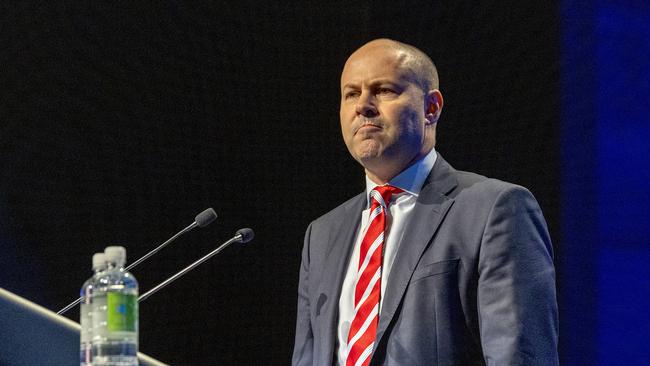Jobs, taxes help slash deficit in bounce back
Josh Frydenberg will upgrade Australia’s economic growth forecasts next week after the nation’s record deficit bill fell almost $8bn in four months.

Josh Frydenberg will upgrade Australia’s economic growth forecasts next week after the nation’s record deficit bill fell almost $8bn in four months on the back of a surging labour market and booming personal income and company tax revenue.
The mid-year budget update released by the Treasurer on Thursday week will reveal the economy had shaken-off Delta outbreaks, which plunged 13 million Australians into lockdowns, and was on track to significantly exceed Treasury forecasts made in the May 11 budget.
The improved position will put the Coalition on the front foot ahead of the election barring new variants slowing the national reopening plan. Scott Morrison and Anthony Albanese are preparing to fight the election over post-pandemic economic recovery plans, headlined by clashes over wages, jobs growth, skills, manufacturing, productivity, tax and red tape reform.
Mr Frydenberg on Sunday said the federal government would update its economic growth projections following the lead of the Reserve Bank, which last month increased its forecast for 2022 to 5.5 per cent.
With Treasury predicting growth of more than 1.5 per cent in the December quarter and a return to pre-pandemic levels before a likely May election, Mr Frydenberg said high national vaccination rates and fewer Covid-19 restrictions supported upgraded economic growth forecasts.
“We’ve already seen the OECD increase their economic outlook for Australia next year from 3.3 to 4.1 per cent. You’ve got the RBA forecasting growth of up to 5.5 per cent by the end of next year,” Mr Frydenberg said.
The easing of international and domestic border restrictions and return of overseas students, tourists and economic migrants in the coming months will increase growth forecasts in the mid-year economic and fiscal outlook and offset the 1.9 per cent GDP slump in the September quarter.
October financial statements released on Monday show a dramatic reduction in the 2021-22 budget deficit profile, with the return of 350,000 jobs helping shave the deficit from $51.8bn to $43.9bn. Better-than-expected personal income and company tax receipts, already exceeding Treasury forecasts by $15.6bn, will drive further improvements in the budget bottomline in the November results.
Finance Minister Simon Birmingham said the economy would keep growing and improve the budget position as more Australians returned to work and came off welfare, with JobSeeker payments already $1.2bn lower than projected in May.
“Whilst we continue to grapple with Covid curveballs such as the Omicron strain, this boost to the budget bottom line is demonstration that our economy remains resilient. Resilience throughout the economy, improved business confidence and a relatively strong labour market is strengthening our budget position,” Senator Birmingham said.
Mr Frydenberg said the government’s focus at the start of the pandemic had been to “save jobs” and was now shifting to lowering the 5.2 per cent unemployment rate and getting more Australians into work. He said a tighter labour market would push wages growth up and that the RBA was forecasting that “unemployment would get down into the 4s and sustainably be there”.
“It will be only the second time in the last 50 years that this has happened,” he said.
“If you ask me what has been the most significant economic achievement through this pandemic? It’s been saving jobs and getting the unemployment rate down and avoiding the long-term unemployment that we saw in Australia after the 80s and 90s recessions.”
With business groups urging governments to not overreact to the emergence of the Omicron variant, Mr Frydenberg said there was no evidence the vaccines would not be effective against the Covid-19 strain. The assurance from the Treasurer came despite confirmation that global growth forecasts would be downgraded in response to the new variant.
“Firstly, it’s too early to make any conclusive decisions or estimates about the economy as a result of Omicron. But what we do know is it’s transmissible, highly transmissible. There’s some early signs it may be less severe than the Delta variant and there is no evidence as yet that our vaccines are not a defence against it,” he said.
“I don’t think we should be panicking. I think everyone should keep their heads and we should be calmly and safely reopening as we have been.”
The improved budget position, driven by spikes in retail sales and surging consumer confidence, came despite more than $10bn in company tax cuts for small businesses and the government paying almost $13bn on Covid disaster payments.
Senator Birmingham said the “the strength in tax being paid is further proof of Australia’s economic recovery”.
The Australian understands senior government figures involved in expenditure review committee of cabinet meetings held before the Christmas break have advocated for the March 29 budget to reflect “constraint” and move away from record spending required during the pandemic.
The Coalition and Labor have been considering whether they would support extending the low and middle income tax offset (LITO) ahead of the election. The extension of tax cuts for low-income earners is considered the most practical sweetener for voters.
E



To join the conversation, please log in. Don't have an account? Register
Join the conversation, you are commenting as Logout